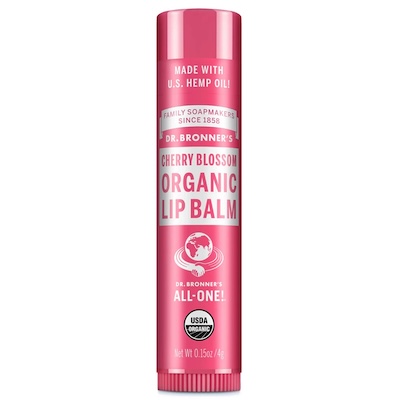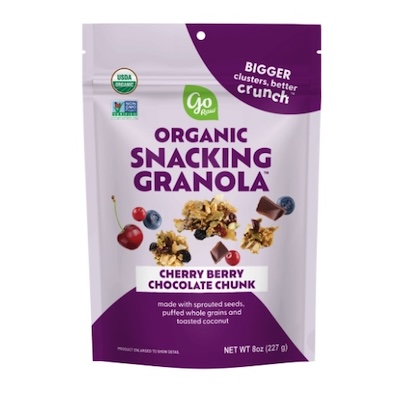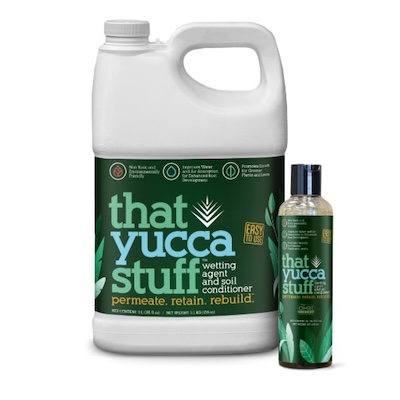
For Vanilla Bean Project, Wind-Energy Shipping is the Present and Future
(Photo courtesy of Grain de Sail)
How Organic Insider operates: We accept no advertising, we have no paywalls and we make our newsletters free to everyone because vital information about our industry needs to get out to as many people as possible. Please consider supporting our work, whether you are an individual or a company. Thank you so much.
Soil regeneration, compostable packaging and upcycled ingredients.
Despite these very meaningful and impactful initiatives, the U.S. organic industry is still importing products from all over the world, largely using fossil fuel cargo ships, a significant emissions contributor. After all, 80% of global trade, by volume, is transported by sea.
Vanilla Bean Project, which sells natural, organic and Regenerative Organic Certified® (ROC) vanilla sourced from Madagascar, 10,000 miles away, is changing that paradigm.
“Our next chapter involves transporting primary raw material across the ocean by wind, and the economics work,” said Sara Kubiak, co-founder of Vanilla Bean Project. “We are excited about the opportunity to layer ROC ingredients with the lowest carbon shipping. It aligns with the world that we want to live in, and we are actively working to create that future.”
By utilizing wind-powered shipping to send its vanilla from Europe to the U.S., the company estimates it is achieving a 90% emission reduction. Furthermore, Vanilla Bean Project is also able to offer unprecedented low levels of Scope 3 emissions — indirect greenhouse gas emissions — to its customers, something increasingly important to retailers.
Not only will California’s Climate Corporate Data Accountability Act require large companies doing business in California to soon disclose their Scope 3 emissions, but Amazon has also announced that it has set climate-related expectations for key suppliers, including providing decarbonization plans, to reach its goal of achieving net zero carbon emissions by 2040. Scope 3 emissions account for approximately 75% of Amazon’s carbon footprint.
Additionally, the recently introduced Purpose Pledge, which numerous prominent organic brands have joined, intends to have its participants report their Scope 3 emissions.
GETTING STARTED, WITH SCALE IN MIND
Vanilla Bean Project embarked on its first trans-Atlantic sail-cargo voyage several days ago for its ROC vanilla beans aboard the Grain De Sail II, but this required getting its product from Madagascar to France the conventional way. The beans have since left Saint Malo, France — aboard the wind-cargo boat — and are expected to arrive in New York City later this month.
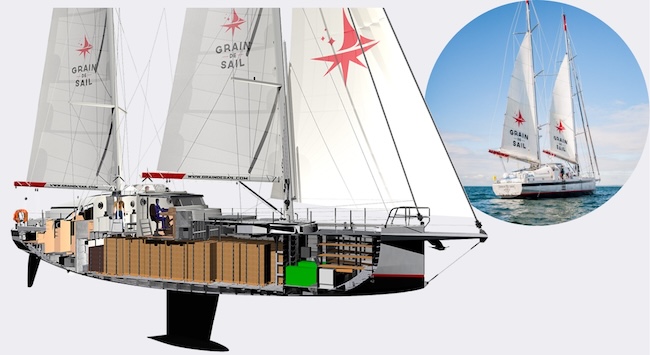 (Photo courtesy of Grain de Sail)
(Photo courtesy of Grain de Sail)
Although this first shipment is relatively small, scaling up is a priority.
The company is finalizing contracts that will move ‘multiple metric tons’ of vanilla beans and has invested in a European cooperative building a wind-powered ship, expected to launch in 2027. This vessel will allow the company to transport products by wind from Madagascar to France, closing the current logistics gap.
The main objections to wind-powered shipping are time and cost differentials.
“It does take slightly longer, and currently, Grain de Sail is a premium over containers,” said Andy Kubiak, co-founder of Vanilla Bean Project. “However, we believe this extra cost will erode over time. Technology is rapidly advancing, with newer ships offering second-generation biofuels, electrification and wind, and these are less carbon-emitting than big diesel.”
“But this argument about cost is the same one we have faced in the organic food industry for decades. While it may be less expensive at the supermarket, the price of conventional food does not account for the true cost it exacts on the environment and farmworkers through toxic chemicals and synthetic fertilizers. The same holds true for shipping via fossil fuels compared to shipping via wind.”
Major players have been taking note.
Global commodities giant Cargill has been looking at wind-powered shipping for years, and Pyxis Ocean (below) is the first bulk carrier retrofitted with 37-meter-long (150 feet), airplane-style wings called WindWings, which allow the ship to harness the power of wind.
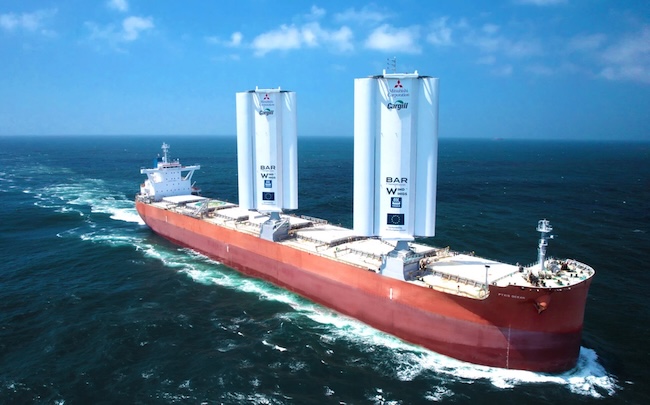 (Photo courtesy of Cargill)
(Photo courtesy of Cargill)
The Pyxis Ocean has completed multiple voyages, crossing the Indian, Pacific and Atlantic oceans, and it has sailed around Cape Horn and the Cape of Good Hope, facing a wide variety of weather conditions along the way. Based on the small sample set of data, it reported a long-term average of 11 tons of carbon dioxide savings per day of sailing.
For Vanilla Bean Project, Cargill’s investment in this space is further validation of how global shipping will evolve.
“We are a profitable company and believe in doing great things together, while showing the world what is possible,” said Andy Kubiak. “Wind-cargo shipping is a mega-trend for the natural products industry.”
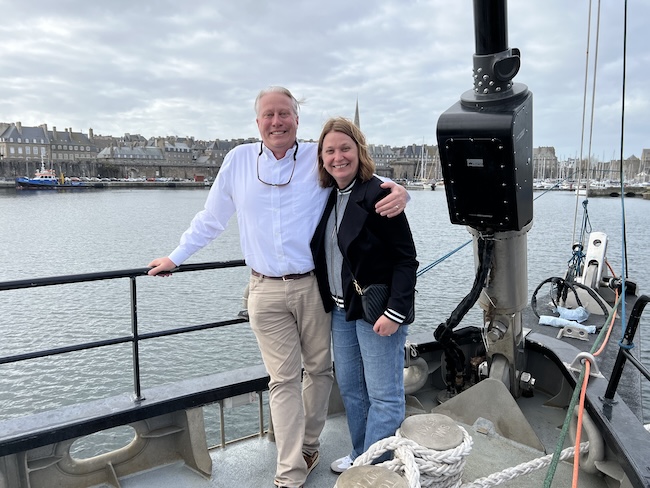 (Andy and Sara Kubiak, founders of Vanilla Bean Project, on the Grain de Sail II)
(Andy and Sara Kubiak, founders of Vanilla Bean Project, on the Grain de Sail II)
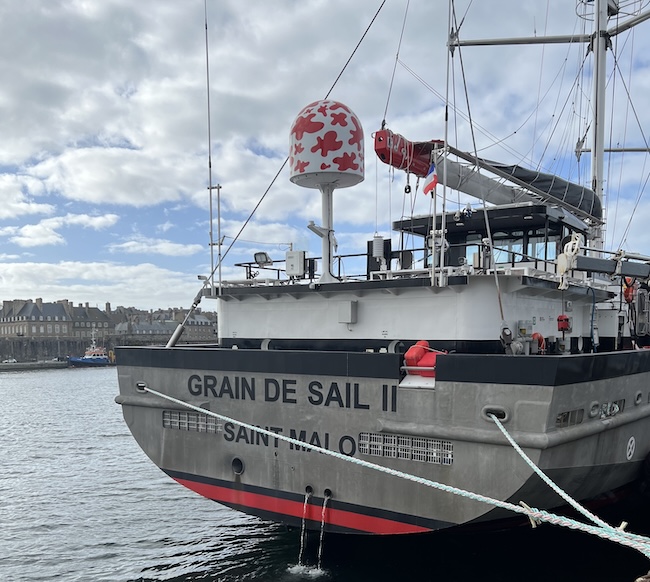 (Grain de Sail II in Saint Malo, France)
(Grain de Sail II in Saint Malo, France)
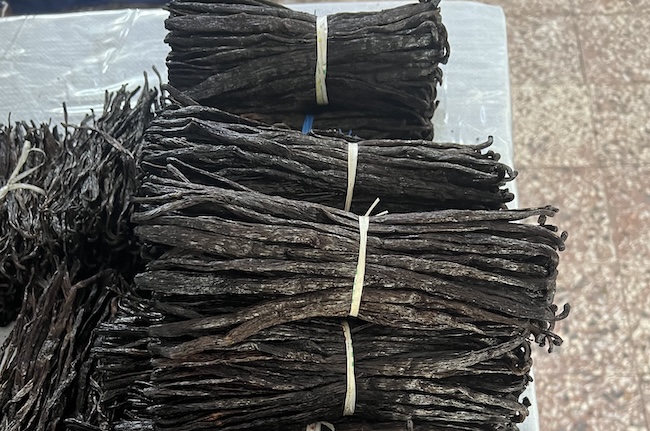 (Post-harvest vanilla from Vanilla Bean Project)
(Post-harvest vanilla from Vanilla Bean Project)
 |
With gratitude, 
Max Goldberg, Founder |
Quick Hits
* The spring meeting of the National Organic Standards Board will take place virtually from April 29 to May 1.
* For a limited time only, Cult Crackers is making organic, gluten-free and grain-free matzoh.
* In California, the West Contra Costa Unified School District and Conscious Kitchen launched the “Organic Strawberry Campaign,” a statewide school food challenge celebrating local, organic strawberries.
* Natural Grocers and Rodale Institute are celebrating Earth Month with the Annual Ladybug Love Campaign.
* On May 30, the Oregon Organic Hazelnut Collective will host its annual summer farm tour.
* In Barcelona, subway ads now promote the benefits of organic food.
* LOLA has partnered with the WNBA champion New York Liberty and Barclays Center to offer free organic period care.
* Talo Organic has scored funding for seed oil-free restaurants.
* In Barbados, a plan to convert 1,000 acres to regenerative organic farmland.
* The Army has a fast-food problem. Can a TV chef fix that?
New Organic Products
Cherry Blossom Collection from Dr. Bronner's
For a limited time and only available on the company's website, Dr. Bronner's is offering its Cherry Blossom Collection, which comes in all of the liquid sizes of the Castile Magic Soap, including the refill box, as well as the soap bar and lip balm. Cherry Blossom is a cheery and bright scent that is both fruity and floral.Quick Bread & Muffin Mixes from Birch Benders
Birch Benders has launched the first widely available organic Quick Bread & Muffin Mixes in two flavors -- chocolate chip and blueberry. Combining the convenience of quick baking with organic ingredients, these products can be found at select retailers nationwide, such as Walmart and Kroger banner stores, in addition to the company's website.Snacking Granola from Go Raw
Sprouted snack company Go Raw has unveiled Snacking Granola. Created with bigger clusters and crunch than traditional granola, the product features sprouted seeds and puffed whole grains. Available in five flavors -- sweet & salty, dark chocolate chunk, chocolate peanut butter, cranberry almond and cherry berry chocolate chunk -- it is USDA certified organic, gluten-free, oat-free and vegan.That Yucca Stuff™ from Hungry Planet Organics
New from Hungry Planet Organics is That Yucca Stuff™, an eco-friendly soil conditioner for home gardeners designed to enhance plant health, improve soil structure, promote sustainable growth, and allow water and air to permeate more effectively. Made from 100% certified organic ingredients, including 97% yucca extract, 2% citric acid and 1% humic acid, it is OMRI-approved for organic production and contains no synthetic additives or chemicals.
Weekly News Summaries

Hershey to buy Lesser Evil
By Christopher Doering
The reported price tag for the organic snack maker is approximately $750 million.

CCOF Employee Identified as Source of Threat to Organic Watchdog Organizaiton
By Indiana Schilz
Authorities say 23-year-old Gabriel Anthony Autio Ramirez, an employee of CCOF, made a threatening call to leadership at OrganicEye. Before the call in February 2024, the Vernon County Sheriff’s Office in Wisconsin had also received reports of threatening emails sent to the group in late 2023. The threats reportedly began shortly after OrganicEye filed a formal complaint against CCOF, alleging federal law violations related to conflicts of interest.

House Republican Proposal Seeks to Exempt Many Toxic "Forever Chemicals" from Review
By Tom Perkins
A new Republican plan would exempt many new toxic PFAS or “forever chemicals” from health and safety review, a move criticized by opponents because it would allow the dangerous man-made substances to be used and sold with little effective scrutiny.

Chef Robotics raises $21M to Continue Building AI Robot Arms
By CJ Haddad
This technology could be of massive help to co-packers.

Senator Cory Booker Introduces Bill to ‘Honor Farmer Contracts’
By Lisa Held
Booker’s bill, also introduced in the House by Representative Gabe Vasquez, would require the USDA to release frozen grant funds and prohibit the termination of existing contracts.

Organic Certifier OneCert Changes Ownership
The highly respected certifier Sam Welsch has stepped down, and Karlin Warner has taken over ownership of OneCert.

AI-Powered CPG Startup Raises $11m to Predict Next Big Food Trend
By Ryan Daily
Starday is using AI to reduce research and development time, while identifying untapped areas of whitespace for innovation.

OFRF launches Organic Research Hub to Support Farmers Nationwide
The Organic Farming Research Foundation has unveiled the Organic Research Hub, a new online platform giving organic and transitioning farmers access to trusted, science-based tools to overcome production challenges.

Class Action Lawsuit Against the Girl Scouts for Contaminated Cookies
By Tom Perkins
Girl Scout cookies contain lead, arsenic, cadmium, aluminum and mercury at levels that often exceed regulators’ recommended limits, as well as concerning amounts of a toxic herbicide, a new class action lawsuit alleges.
Want to share this newsletter on social media? You can use this link: Newsletter Link
The material in this newsletter is copyrighted and may be reprinted by permission only. All requests must be in writing. Please use our contact form to request republication rights.
Newsletter Archive
Quick Hits
* The spring meeting of the National Organic Standards Board will take place virtually from April 29 to May 1.
* For a limited time only, Cult Crackers is making organic, gluten-free and grain-free matzoh.
* In California, the West Contra Costa Unified School District and Conscious Kitchen launched the “Organic Strawberry Campaign,” a statewide school food challenge celebrating local, organic strawberries.
* Natural Grocers and Rodale Institute are celebrating Earth Month with the Annual Ladybug Love Campaign.
* On May 30, the Oregon Organic Hazelnut Collective will host its annual summer farm tour.
* In Barcelona, subway ads now promote the benefits of organic food.
* LOLA has partnered with the WNBA champion New York Liberty and Barclays Center to offer free organic period care.
* Talo Organic has scored funding for seed oil-free restaurants.
* In Barbados, a plan to convert 1,000 acres to regenerative organic farmland.
* The Army has a fast-food problem. Can a TV chef fix that?
